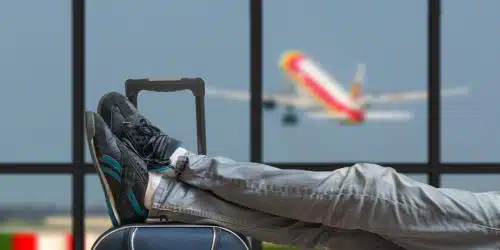Motion sickness is a common type of sickness related to flying that can make you feel nauseous while traveling in a car, boat, or plane. Some tips to handle flying sickness for the first time are given in this post. It includes relaxation techniques such as deep breathing, and distracting yourself with in-flight entertainment or activities. Additionally, you can consider wearing a scopolamine patch or booking a seat close to the wings for a smoother ride. If you are concerned about your health, seek advice from a doctor before flying.
First-Time Flying Tips
First-time flight travel can be an exciting experience, but it also comes with its share of challenges, especially for those who have never been on an airplane before. Some of the common challenges associated with first-time flight travel include:
#1. Anxiety and Nervousness
First-time travelers may experience anxiety or nervousness about flying, especially if they have a fear of heights or are unsure about the whole flying process.
Airports can be large and overwhelming, especially for someone unfamiliar with the layout. Finding the check-in counters, security checkpoints, and boarding gates can be a challenge.
#3. Understanding the Process
The process of checking in, going through security, and boarding the plane might be confusing for first-time travelers, leading to potential delays or stress.
#4. Packing and Baggage Rules
Understanding the baggage rules, weight limits, and restrictions on what can be carried in carry-on and checked luggage can be challenging for beginners.
#5. Fear of Flying
Some first-time travelers may have a fear of flying, making the journey emotionally difficult for them.
#6. Comfort and Jet Lag
Long flights can be uncomfortable, and dealing with jet lag after crossing time zones can be challenging, especially if it’s the first time experiencing it.
#7. Communication and Language Barrier
Language barriers may exist in foreign airports, and first-time travelers might find it challenging to communicate with airport staff or locals.
#8. Delays and Cancellations
Flights can be delayed or canceled due to weather, technical issues, or other reasons, which can disrupt travel plans, especially for those with tight connections.
#9. Lost Luggage
There’s always a risk of checked luggage getting lost or delayed. It can be stressful for first-time travelers who might not be familiar with the process of filing a report and waiting for their bags to be found.
#10. Security Concerns
Some travelers might feel uneasy about the security measures, such as body scanners and pat-downs, especially if they have never experienced them before.
#11. Air Sickness
First-time travelers might not be accustomed to the motion of flying, and some may experience air sickness or motion discomfort.
#12. Flight Connections
If the journey involves connecting flights, first-time travelers might find it challenging to navigate unfamiliar airports and ensure they don’t miss their connecting flight.
Tips To Ensure a Smooth Journey Experience
Flying for the first time can be an exciting and sometimes nerve-wracking experience. To ensure a smooth and enjoyable journey, here are some first-time flying tips:
#1. Arrive early
Plan to arrive at the airport well in advance. At least 2 hours before domestic flights and 3 hours before international flights. This allows you to go through check-in, and security, and find your gate without rushing.
#2. Pack wisely
Check the airline’s baggage rules and pack accordingly. Keep essential items, such as medications, important documents, and a change of clothes, in your carry-on bag in case your checked luggage gets delayed.
#3. Travel documents
Double-check that you have all necessary travel documents, including your passport (if traveling internationally), boarding pass, identification, and any visas required for your destination.
#4. Security procedures
Be prepared for airport security. Wear easy-to-remove shoes, and avoid carrying prohibited items like liquids over 100ml, sharp objects, or firearms.
#5. Seating preference
During the booking process, try to select your seat in advance. If you’re unsure, a window seat can offer a view and a place to rest your head. While an aisle seat allows for easy access to the restroom and more legroom.
#6. Comfortable clothing
Wear comfortable, layered clothing as cabin temperatures can vary. Also, bring a sweater or jacket with you as airplanes can get chilly.
#7. Stay hydrated
Drink plenty of water before and during your flight to combat the dry air in the cabin.
#8. Ear discomfort
To alleviate ear pressure during takeoff and landing, chew gum, yawn, or use earplugs to help regulate the pressure in your ears.
#9. Entertainment
Bring along some form of entertainment such as a book, music, or movies to pass the time during the flight.
#10. Movement during the flight
On longer flights, try to get up and walk around the cabin periodically to stretch your legs and avoid stiffness.
#11. Airplane etiquette
Be considerate of your fellow passengers. Avoid talking loudly, keep your phone on silent mode, and ask for permission before reclining your seat.
#12. Follow the crew’s instructions
Pay attention to the safety demonstrations, and follow the instructions given by the flight attendants throughout the flight.
#13. Motion sickness
If you’re prone to motion sickness, consider taking appropriate medication before the flight. Ginger candies or ginger-based products can also help with nausea.
#14. Stay calm
Remember that flying is one of the safest modes of transportation. If you feel anxious, try deep breathing exercises or distract yourself with music or a movie.
#15. Have a plan upon arrival
Research the airport layout and know how you’ll get to your accommodation upon arrival. Familiarize yourself with public transportation or arrange for a pickup in advance.
Flying can be an incredible experience, and following these tips will help ensure your first flight goes smoothly. Enjoy your journey!
Common Issues To Avoid As A Traveler
Here are some “don’ts” for first-time flight travelers to help them avoid common pitfalls and make their flying experience smoother:
#1. Don’t Forget to Check in Online
Many airlines offer online check-in, which saves time at the airport. Check-in early to secure your preferred seat.
#2. Don’t Arrive Late
Give yourself plenty of time to get to the airport, go through security, and find your gate. Missing your flight can be a costly and frustrating experience.
#3. Don’t Overpack Your Carry-on
Airlines have specific size and weight restrictions for carry-on luggage. Avoid overpacking to prevent difficulties in stowing your bag or having to check it at the gate.
#4. Don’t Bring Prohibited Items
Familiarize yourself with the Transportation Security Administration (TSA) guidelines on prohibited items to avoid delays at security checkpoints.
#5. Don’t Wear Complicated Outfits or Accessories
Choose comfortable and simple clothing that allows you to move easily. Avoid wearing excessive jewelry or clothing with metal components that may trigger alarms at security.
#6. Don’t Forget to Stay Hydrated
Airplane cabins can be dehydrating, so drink water regularly throughout the flight to stay comfortable.
#7. Don’t be Afraid to Ask For Help
If you’re unsure about something or need assistance, don’t hesitate to ask the airline staff or airport personnel. They are there to help.
#8. Don’t Ignore Safety Instructions
Pay attention to the safety demonstration and follow the instructions provided by the flight attendants during the flight.
#9. Don’t Recline Your Seat Abruptly
If you want to recline your seat, do it gradually and check behind you to avoid surprising the person seated behind you.
#10. Don’t Stand Up Before the Seatbelt Sign is Off
Wait for the seatbelt sign to be turned off before getting up from your seat or using the restroom.
#11. Don’t Disturb Other Passengers
Be mindful of the space around you and avoid leaning your seat back too far, bumping into others, or talking loudly.
#12. Don’t Forget to Pack Your Essential Items
Make sure you have your passport, travel documents, medications, and anything you may need during the flight easily accessible in your carry-on bag.
#13. Don’t Rush to Deboard
When the flight lands, be patient and wait for your row to be called before standing up to deboard. Rushing can lead to unnecessary chaos and delays.
#14. Don’t Forget to Double-Check Your Belongings
Before leaving the aircraft, check your seat pocket, under your seat, and the overhead bins to ensure you haven’t left anything behind.
#15. Don’t Stress Over Minor Delays
Flight delays can happen due to various reasons. Stay calm and flexible, and keep yourself entertained while waiting.
Rules and Regulations That Must Be Adhere To
During flight travel, there are certain restrictions and regulations that passengers must adhere to ensure safety and security. First-time passengers need to be aware of these restrictions and comply with them to ensure a safe and pleasant flight experience for everyone on board.
These restrictions may vary depending on the airline, country, and specific flight, but some common restrictions include:
#1. Carry-On Baggage Size and Weight
Airlines have specific limitations on the size and weight of carry-on baggage. Check with your airline to ensure your carry-on meets their requirements.
#2. Liquids, Gels, and Aerosols
Passengers are generally allowed to carry liquids, gels, and aerosols in containers of 100ml (3.4 ounces) or less in their carry-on bags. These containers must fit in a single quart-sized clear plastic bag for security screening.
#3. Prohibited Items
Sharp objects, flammable materials, explosives, and other dangerous items are not allowed in carry-on or checked baggage.
#4. Electronic Devices
While electronic devices such as smartphones and tablets are generally allowed, some airlines may have restrictions on their use during takeoff and landing.
#5. Smoking
Smoking is strictly prohibited on all commercial flights.
#6. Seatbelt Sign
Passengers must fasten their seatbelts whenever the seatbelt sign is illuminated, usually during takeoff, landing, and turbulent conditions.
#7. Alcohol Consumption
Passengers are not allowed to consume alcoholic beverages on the plane. Alcoholic beverages served by the flight crew should be consumed responsibly.
#8. Disruptive Behavior
Passengers must refrain from engaging in disruptive behavior that may compromise the safety and well-being of others on the flight.
#9. Flight Crew Instructions
Passengers are required to follow all instructions given by the flight attendants and the aircraft crew. Including safety demonstrations and emergency procedures.
#10. Drones
Drones or unmanned aerial vehicles (UAVs) are not allowed on commercial flights, both in carry-on and checked baggage.
#11. Restricted Areas
Passengers are not allowed to access certain areas of the aircraft, including the cockpit and designated crew-only spaces.
What Helps With First-Time Flying?
First-time flyers need to arrive early, check in online, and pack appropriately following TSA regulations. Stay hydrated, and follow the airline staff’s safety instructions. Additionally, it’s beneficial to practice relaxation techniques and bring comfort items. It is good to distract oneself with in-flight entertainment or activities to alleviate any anxiety or nervousness. Seeking advice from a doctor and educating oneself about the safety of flying can also be helpful.
How Do I Prepare For My First Plane Ride?
To prepare for your first plane ride, book your flight tickets in advance and check your travel documents. Research your airline’s policies and amenities. Pack essential items in your carry-on bag and check in online if possible. Arrive at the airport early, dress comfortably, and stay hydrated. Familiarize yourself with airport layouts and TSA security guidelines. Listen to safety instructions, find your seat calmly, and enjoy the experience of your first plane ride.
What Should I Do On My First Flight Alone?
On your first flight alone, arrive early at the airport, pack essential items in your carry-on, and stay organized with travel documents. Dress comfortably, stay hydrated, and remain calm during the flight. Bring entertainment, follow safety instructions, and be respectful to staff and passengers. Enjoy the experience and stay connected with loved ones.
Can I Use My Phone On A Plane?
Yes, you can use your phone on a plane, but only in certain ways. You are allowed to use your phone in airplane mode, which turns off cellular, Wi-Fi, and Bluetooth functionality. You can access apps and features that are stored locally on your phone. Such as games, music, and e-books. You cannot make or receive phone calls, send or receive text messages, or use cellular data while in flight. It’s important to follow airline rules and regulations regarding the use of electronic devices on planes to avoid any potential safety hazards.
How Can I Calm My Nerves While Flying?
To calm nerves while flying, practice deep breathing, positive thinking, and visualization. Stay occupied with distractions like books or music, and choose an aisle seat for comfort. Inform the flight crew about your nervousness, stay hydrated, and avoid caffeine and alcohol. Engage in conversation, educate yourself about flying, and trust the professionals. Accept your feelings without judgment and focus on the excitement of your destination.
Conclusion
First-time flying tips provide essential guidance for newcomers to air travel. These 15 best tips cover various aspects, such as packing efficiently, arriving early, checking in online, and understanding airport security procedures. They also advise on carrying essential travel documents, staying comfortable during the flight, and being prepared for unexpected situations. With these tips, first-time flyers can feel more confident and enjoy a smoother journey in the skies.
To help with first-time flying, do your research and arrive at the airport early. Pack essentials in your carry-on and dress comfortably. Stay hydrated, positive, and practice deep breathing. Bring entertainment, follow safety instructions, and engage politely with the crew and fellow passengers. Embrace the experience and stay connected with loved ones. Flying can be an enjoyable adventure with the right preparation and mindset.
Related Articles
- HOW TO PLAN A TRIP: Detailed Guide
- DO YOU NEED A PASSPORT TO GO TO HAWAII?
- ECONOMY CLASS: Flights and Features
- EMBARKATION PORT: Definition and All You Need To Know
- 21 TOP BUDGET TRAVEL TIPS






